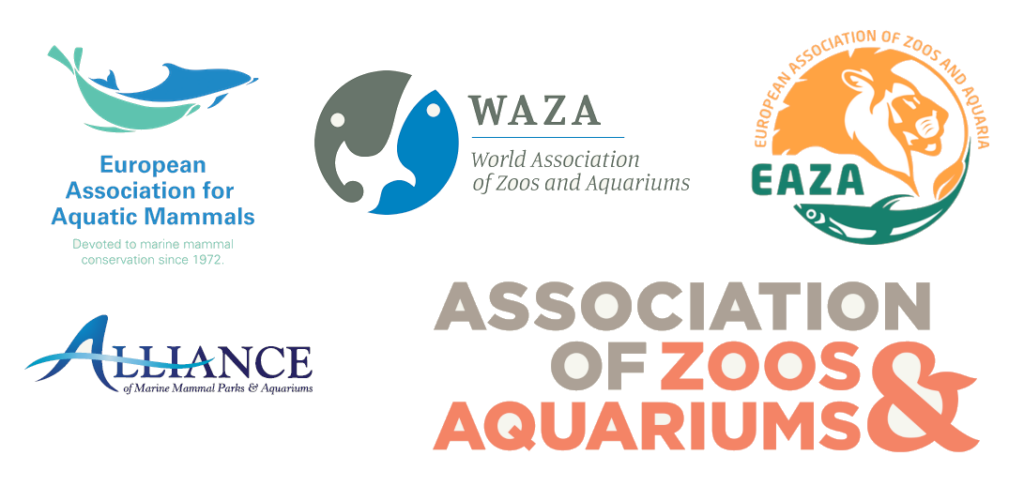
Source: https://eaam.org/join-letter-to-french-minister/
Dear Madame Minister,
The European Association of Zoos and Aquaria (EAZA), the European Association for Aquatic Mammals (EAAM), the World Association of Zoos and Aquariums (WAZA), the Association of Zoos Aquariums (AZA), and the Alliance of Marine Mammal Parks and Aquariums (AMMPA) represent some of the world’s best zoological institutions and are active in conservation, research and education both locally and globally.
We write to urge you to re‐consider the decision announced on 29 September 2020 to ban the breeding of cetaceans in French zoos and aquariums. If implemented, the consequences for in situ and ex situ conservation of cetaceans in France and by French conservationists globally could be negatively impacted, and the welfare of animals compromised.
Under the Convention on Biological Diversity, all Contracting Parties, including France, are obligated to adopt measures for ex situ conservation as a complement to in situ measures (i). The International Union for the Conservation of Nature (IUCN) defines ex situ conservation as that where animals are maintained in artificial conditions under different selection pressures than those in natural conditions in a natural habitat (ii). Ex situ conservation is a key element of wider holistic approaches to conservation and is at the core of most activities undertaken by professional zoos and aquariums.
Zoos and aquariums are recognised as leaders in ex situ conservation by bodies including the United Nations Convention on Biological Diversity (iii) the Convention on International Trade in Endangered Species of Fauna and Flora (iv), the IUCN2, the Pontifical Academy of Sciences (v), the European Union (vi) and many other leading agencies and institutions dedicated to the preservation of biodiversity.
Specialist knowledge about ex situ management of cetaceans, typified by the expertise in zoos and aquariums, is essential to secure the future of endangered dolphin and porpoise species. Indeed, a recent IUCN report points to the urgent need for early intervention from ex situ conservationists to save species (vii). It notes that a lack of such involvement at key moments has directly led to the extinction of the Yangtse river dolphin (Lipotes vexillifer) and the likely extinction of the vaquita (Phocoena sinus). We therefore believe that removing any ex situ conservation capacity for these species, as for others, would be a serious mistake. This capacity necessarily includes the breeding of cetaceans, an essential part of any nurturing animal’s life experience.
By phasing out cetaceans from French institutions through a breeding ban, the French government makes it impossible for the country to be involved in such conservation efforts to save the dolphin species that are most endangered today or those that may be tomorrow. While there is currently no immediate extinction threat for bottlenose dolphins, other species have seen unexpected and very large wild population decreases over very short periods (for example, the roughly 60% decline in giraffe populations over the last two decades).
The population of bottlenose dolphin (Tursiops truncatus) in the European region is managed by EAZA as an EEP (EAZA Ex situ Programme). The Bottlenose dolphin EEP is among the most successful programmes of its kind and has led to a long‐term, demographically and genetically self‐sustaining population in Europe. While the programme is performing very well, losing the 29 dolphins in the care of French institutions from the breeding pool (11% of the EEP population) would make the overall situation precarious. Our Associations strongly oppose the elimination of populations through breeding bans, because it often compromises the welfare of animals left alone as their social group gradually dies out.
Our networks are not large enough to accommodate these animals, and our Associations would vigorously oppose any attempt to move animals to institutions with a lower standard of welfare.
Furthermore, no animal currently in the care of French institutions is releasable into the ocean and there is no mandate or ground for such action, and such a release would pose serious risks for individual animals and wild cetacean populations. If the announced decision is implemented, we believe that the lifetime options for these animals would be severely restricted and contrary to the French public’s view on the need to ensure the positive welfare of the animals concerned.
The appeal of cetaceans, as evidenced by visitor numbers, creates significant opportunities for zoological institutions to educate the public about biodiversity conservation and to motivate more conservation‐minded behaviour.
While these charismatic species are highly popular, there’s no sound basis to regulate holding and breeding of cetaceans differently from other species. As the European Commission has repeatedly confirmed, cetaceans are not excluded from and are subject to the same requirements as any other species under the Zoos Directive (viii).
Cetacean conservation, like all nature conservation, is at a critical phase, and we urge the government to allow French zoos and aquariums to continue to play their part. If we can provide you with further information regarding cetacean conservation, welfare, and research, please do not hesitate to contact us. Like you, we believe that the welfare of cetaceans in human care is a matter of the highest ethical and scientific concern. We would value the opportunity to work with you to ensure this outcome.
Yours sincerely,
Dr Thomas Kauffels (EAZA Chair), Dr Renato Lenzi, (EAAM President), Prof Dr Theo Pagel (WAZA President), Dan Ashe (AZA President and CEO) and Kathleen Dezio, (AMMPA President and CEO).
The European Association of Zoos and Aquaria (EAZA) is the membership organisation of the most progressive zoos and aquariums in Europe and Western Asia. The Association comprises over 400 Members in 48 countries, including zoological institutions and their partners in conservation, education, animal welfare and research. EAZA administers the EEP (EAZA Ex situ Programmes), a state‐of‐the‐art population management structure that provides scientifically‐led ex situ support to holistic efforts to save and protect animal species worldwide.
The European Association for Aquatic Mammals (EAAM) was established in 1972. The EAAM’s mission is the welfare and conservation of marine mammals through research, medical care, training, education, conservation, management and related activities. The EAAM’s membership includes veterinarians, biologists, zoo and marine park directors and managers, trainers and caretakers, researchers, students and other persons who devote a significant amount of time to the in situ and ex situ welfare and conservation of marine mammals.
Since 1935, the goal of the World Association of Zoos and Aquariums (WAZA) has been to guide, encourage and support the zoos, aquariums and like‐minded organisations of the world in animal care and welfare, environmental education and global conservation. WAZA is the global alliance of regional associations, national federations, zoos and aquariums, dedicated to the care and conservation of animals and their habitats around the world. The membership consists of nearly 400 leading institutions and organisations around the world, and this number continues to grow.
The Association of Zoos and Aquariums (AZA) is a 501(c)3 non‐profit organization dedicated to the advancement of accredited zoos and aquariums in the areas of conservation, education, science, and recreation. AZA represents more than 240 facilities in the United States and overseas, which collectively draw more than 200 million visitors every year. AZA‐accredited zoos and aquariums meet the highest standards in animal care and welfare and provide a fun, safe, and educational family experience. In addition, they dedicate millions of dollars annually to support scientific research, conservation, and education programs.
The Alliance of Marine Mammal Parks and Aquariums (Alliance) is an international association and the accrediting body for marine parks, aquariums, zoos and research facilities. Alliance‐accredited institutions are the gold standard in marine mammal care. With an extensive body of marine mammal knowledge and experience, animal experts at Alliance‐accredited facilities dedicate their lives to the well‐being of the animals in their care and to the rescue and rehabilitation of marine animals such as sea lions, dolphins, manatees, and sea turtles in need of help. Our member institutions reach millions of guests each year and create extraordinary experiences and connections to the natural world that inspire people to take action for marine mammals and our oceans.
i Convention on Biological Diversity, Article 9.
ii IUCN Species Survival Commission Guidelines on the Use of Ex Situ Management for Species Conservation.
iii https://www.cbd.int/doc/speech/2020/sp‐2020‐10‐14‐unga‐en.pdf
iv https://cites.org/eng/CITES_S‐G_KeynotePresentation_WAZA2020_15102020
v Concluding Statement of a conference by the Pontifical Academy of Sciences with international partners from Natural History Museums, Zoological Gardens, Botanical Gardens and Specialists in Biodiversity Protection, 13‐14 May 2019. Casina Pio IV, Vatican City – May 15, 2019.
vi EU Biodiversity Strategy for 2030; Press release, “European Commission announces global biodiversity coalition” 3 March 2020; EU Zoos Directive (Council Directive 1999/22/EC of 29 March 1999 on the keeping of wild animals in zoos).
vii https://iucn‐csg.org/integrated‐conservation‐planning‐for‐cetaceans‐icpc/
viii See e.g., Parliamentary Question reference: E‐000682/2015, Answer given by Mr. Vella on behalf of the Commission 27 February 2015 (“Cetaceans are not excluded from the scope of application of the directive and it is for the Member States to ensure that the measures, set out in Article 3, including in relation to accommodation of the animals, are applied in line with the requirements of the directive.”)










